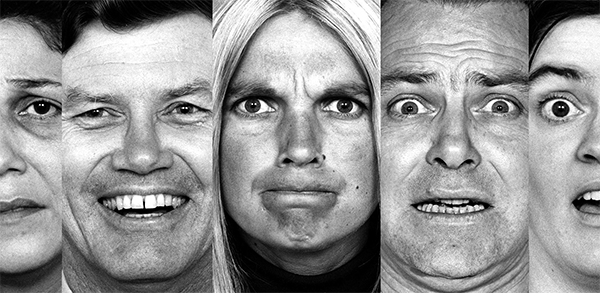Insight #2: What emotions are and what are they really for?

In today's world, emotions are regarded by many people as an obstacle, something undesirable and bringing only problems disturbing the rational work of the mind. But what are emotions? Why do we, thinking beings who consciously design their own existence, have an emotional system that is difficult to control and which often leads us to acts that we cannot understand?
No so different from each other
The emotional response system is what most closely connects us to all mammals. That's why we love dogs so easily, get angry with cats and attach ourselves to horses. For the same reason dogs love us too, cats get angry with us and horses are attached to us. The main role in this mechanism is played by the limbic system, i.e. the most important area of the so-called "paleomammalian complex", which is the part of the brain that is common to all mammals (alongside the "reptilian complex" and the most developed in the primate "neomammalian complex"). These are structures of the brain which are primarily responsible for all emotions, feelings and passions we feel, but also for memory processes, behaviour and inducing and inhibiting motivation.

Source
Types of emotional reactions
It is difficult to clearly and precisely define emotional reactions and classify their different types. Generally speaking, emotional reactions are specific states of the body that occur in response to stimuli. These states manifest themselves in multilevel physiological reactions (e.g. hormonal changes, changes in heart rate and galvanic tension), changes in thinking, motivation and perception of reality, as well as changes in behaviour and specific expression (e.g. facial grimace, raised voice).
The following division of emotional reactions is usually used, although some of these terms are used interchangeably:
- Moods - a shallow emotional reaction with low intensity and long duration (e.g. nostalgia, feeling of peace or satisfaction).
- Affects - short intense emotional reactions, usually not fully recognised by the subject, often remain unconscious (hence "a crime of passion"). They can turn into emotions when they are "noticed" and named by the subject.
- Emotions - intensive reactions, but more specific and focused than affects, can also be controlled to a greater degree.
- Feelings - more complex emotional reactions, accompanying for example aesthetic experiences or feelings connected with morality. Feelings also include love. They are more related to the neocortex ("neomammalian complex") than emotions and affections.

Source
What emotions are there for?
Why has the complex multi-level emotional system evolved among mammals? The answer is simple: the system is quite useful. It increases the chances of survival and reproduction. Emotions can be treated as phenomena coordinating the action of different systems in our body. They appear in response to a situation or problem and help you adapt your body to the most appropriate response. They strive to return the body to homeostasis. Positive emotions mobilize the body to maintain contact with the stimulus, to return to it or to search for similar stimuli. Negative emotions on the other hand force the body to escape from the stimulus, change it, destroy it or simply ignore it.
In many situations, the emotional system is much more effective than a rational analysis of the situation. It acts immediately, activating multiple processes in the body simultaneously. When an animal or a man attacks us, there is no time to think - you should run away or fight. When we are sitting next to a beautiful woman or man during the sunset, we don't think about the rational premises of whether we should kiss her/her kisses, we just let ourselves be carried away by emotions and we do it. Emotions are simply more "economic" and more efficient than cognitive processes. In addition, cognitive processes have little influence on excitement of the aforementioned physiological changes, allowing us to prepare the body for escape or love. Of course, it is never the case that we are only influenced by emotion or rational thinking - these are systems that work together and, in fact, are closely linked.
Emotions are cool
So, what are the adaptive functions of emotions? The joy is accompanied by high motivation to take up new challenges, which can bring various material or social benefits. Anger motivates people to protect their loved ones or their own territory, mobilizes the body by maintaining a high level of agitation and willingness to fight. Sadness makes it easier to reflect on problems and informs about your problems people around you, which can be a good strategy to find a solution to them. Thanks to the sadness and specific apathy accompanying it, it is easier for us to cope with loss or parting. Wonderment is the main stimulus to discover, learn and try new things, and motivates most scientists to solve scientific problems. Disgust tells us what is better not to eat or touch, and what kind of people we should avoid. The attachment (e.g. of the child to the mother and vice versa) has the function of supporting one another, so that the mother is motivated to feed and protect her child, and the (adult) child is motivated to take care of the parents in old age. When the eyebrows are lifted up at the moment of surprise, more light enters the retina and our field of vision increases, resulting in more information from the environment, which allows for a quick reaction.
...but not always
Sometimes emotional reactions are too intense and do not help to adapt to the situation. Too intense sadness in the form of depression can cause a person to stop taking care of basic physiological needs, and too intense aggression can put us in prison for the rest of our lives. Evolution is blind and this can also be seen in the emotional reactions - most of us from time to time feel the excessive emotions that cause more problems than they solve. There are also mental disorders associated with emotions, which also are not at all adaptive. It is therefore possible to distinguish between adaptive and disadaptive emotions. That is, those that are designed to adapt an individual to the environment and those that do more harm than benefits. Sources of disadaptive emotions are an extensive a topic for another occasion, I will only mention that they can be both genetic and environmental factors (education, society, culture). However, when viewed as a whole and averaging the impact of emotions in society, they are a very useful, even essential element in people's lives. Emotions probably played a key role in developing consciousness in homo sapiens.
The future of emotions
It is worth mentioning that our emotions are adapted evolutionarily to the situation which occurred in the period when homo sapiens appeared for the first time, about 200-250 thousand years ago. This means that if mankind survive the next hundreds of thousands of years, our emotions will probably look quite different. After all, we are living in a completely different environment than before, and today a greater threat to us is an unsuccessful corpo presentation than tearing up by the tiger, right? Probably in the not so distant future we will be able to genetically modify our DNA, influence our body electromagnetically or pharmacologically to change our emotions and their expression. But wait a minute.... We are already doing it! Everybody heard about Prozac! Civilization and technological development cause sudden changes in the environment, changing the phenotype of homo sapiens. This kind of "feedback" can significantly speed up the process of evolution, making future emotions better adapted to the contemporary man of the world.
Bibliography:
LeDoux, J. (1998). The emotional brain: The mysterious underpinnings of emotional life. Simon and Schuster.
MacLean, P. D. (1990). The triune brain in evolution: Role in paleocerebral functions. Springer Science & Business Media.
Strelau, J. (Ed.). (2007). Psychologia: podręcznik akademicki. Psychologia ogólna (Vol. 2). Gdanskie Wydawnictwo Psych.
Previous entries in the Insight series:
MacLean, P. D. (1990). The triune brain in evolution: Role in paleocerebral functions. Springer Science & Business Media.
Strelau, J. (Ed.). (2007). Psychologia: podręcznik akademicki. Psychologia ogólna (Vol. 2). Gdanskie Wydawnictwo Psych.

Thats a very profound and well written article. I have always believed that emotions were placed in us for our benefit. I dont see them as a barrier or an obstacle. Whenever I experience a certain emotion I ask myself what is the emotion telling me, then I think clearly on how to manage it and use it to my advantage. This is a great one. I have just resteemed and followed you.
That's a good strategy you use. Of course we can control and change emotions and that's also useful. For example you can think the situation through which changes the perspective of the situation which changes the emotion that it generates. I will propably write another article on emotional control later:) Thank you for your comment and following
Its a nice one that works for me. Our thinking about things change the perspective of the situation which then influences our actions afterwards. When you write another article please let me know so that I can read through.
Hello friend I have just posted an article about "A Great Leader is Responsible." Would you like to read it and give me an upvote?
Here is the link to the post; https://steemit.com/leadership/@arnoldmusa90/a-great-leader-is-responsible